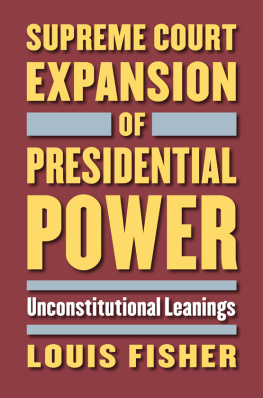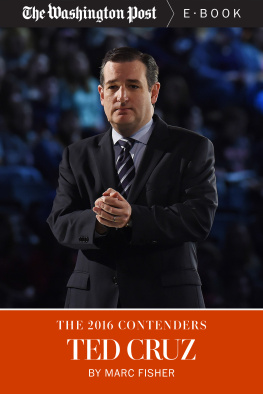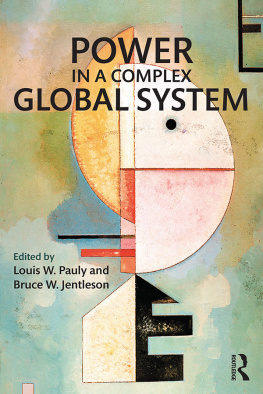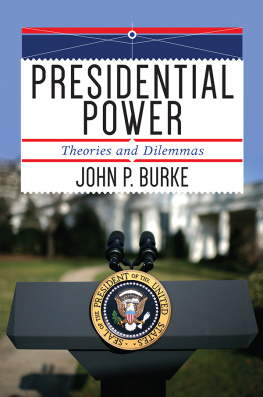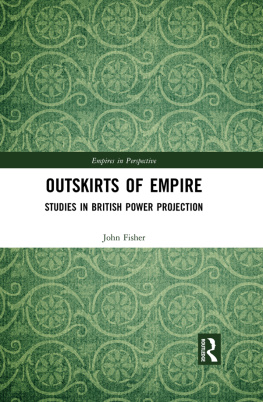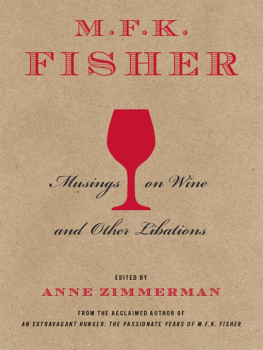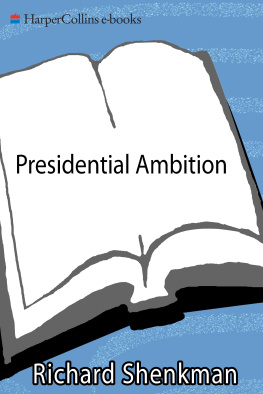Louis Fisher - Presidential War Power
Here you can read online Louis Fisher - Presidential War Power full text of the book (entire story) in english for free. Download pdf and epub, get meaning, cover and reviews about this ebook. year: 2017, genre: Politics. Description of the work, (preface) as well as reviews are available. Best literature library LitArk.com created for fans of good reading and offers a wide selection of genres:
Romance novel
Science fiction
Adventure
Detective
Science
History
Home and family
Prose
Art
Politics
Computer
Non-fiction
Religion
Business
Children
Humor
Choose a favorite category and find really read worthwhile books. Enjoy immersion in the world of imagination, feel the emotions of the characters or learn something new for yourself, make an fascinating discovery.

- Book:Presidential War Power
- Author:
- Genre:
- Year:2017
- Rating:3 / 5
- Favourites:Add to favourites
- Your mark:
- 60
- 1
- 2
- 3
- 4
- 5
Presidential War Power: summary, description and annotation
We offer to read an annotation, description, summary or preface (depends on what the author of the book "Presidential War Power" wrote himself). If you haven't found the necessary information about the book — write in the comments, we will try to find it.
Presidential War Power — read online for free the complete book (whole text) full work
Below is the text of the book, divided by pages. System saving the place of the last page read, allows you to conveniently read the book "Presidential War Power" online for free, without having to search again every time where you left off. Put a bookmark, and you can go to the page where you finished reading at any time.
Font size:
Interval:
Bookmark:
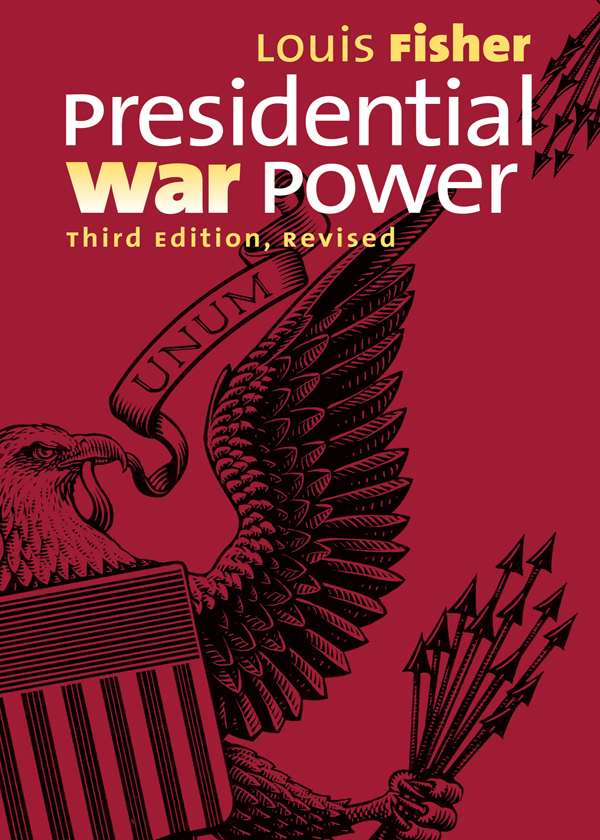

1995, 2004, 2013 by the University Press of Kansas
All rights reserved
Published by the University Press of Kansas (Lawrence, Kansas 66045), which was organized by the Kansas Board of Regents and is operated and funded by Emporia State University, Fort Hays State University, Kansas State University, Pittsburg State University, the University of Kansas, and Wichita State University
Library of Congress Cataloging-in-Publication Data
Fisher, Louis.
Presidential war power / Louis Fisher.Third edition, revised
pages cm
Includes bibliographical references and index.
ISBN 978-0-7006-1930-6 (cloth : alk. paper)
ISBN 978-0-7006-1931-3 (pbk. : alk. paper)
ISBN 978-0-7006-1978-8 (ebook)
1. War and emergency powersUnited States. 2. National securityLaw and legislationUnited States. 3. United StatesForeign relationsLaw and legislation. I. Title.
KF5060.F57 2013
342.73'062--dc23
2013020175
British Library Cataloguing-in-Publication Data is available.
Printed in the United States of America
10 9 8 7 6 5 4 3 2 1
The paper used in this publication is recycled and contains 30 percent postconsumer waste. It is acid free and meets the minimum requirements of the American National Standard for Permanence of Paper for Printed Library Materials Z39.481992.
To the republican principle
that reserves war-making
to the legislature
1
The Constitutional Framework
2
Precedents from 1789 to 1900
3
America Steps Out: 19001945
4
The UN Charter and Korea
5
Taking Stock: 19511964
6
Vietnam and the War Powers Resolution
7
Military Initiatives from Ford to Bush I
8
Military Actions by Clinton
9
George W. Bush
10
Barack Obama
11
Covert Operations
12
Restoring Checks and Balances
The first edition of this book received a lead review in the New York Times Book Review on May 7, 1995. The reviewer, Theodore Draper, noted that ever since the Korean War, Presidents have been violating the Constitution of the United States. He wrote that I had taken on all of the Presidents and their lawyers who have contrived for almost half a century to offer excuses for autonomous Presidential war-making, and called my book a hygienic effort to bring us back to the law.
Those same goals motivate this third edition. The last two decades have underscored the extent to which the power of war has shifted to the presidency, with little restraint by Congress or the courts and little comprehension by the general public of the damage done to constitutional values, representative government, and democracy. The contemporary definition of executive powerto send troops anywhere in the world whenever the President likeswould have astonished the framers of the Constitution. Their structure of government very deliberatively rejected the British models that gave the executive exclusive control over foreign affairs and the war power. Instead, the framers vested in Congress explicit control over the initiation and authorization of war, power over foreign commerce, approval of treaties, confirmation of ambassadors, power of the purse, and other authorities over external affairs.
The trend of presidential war power since World War IIthe last congressionally declared warcollides with the constitutional framework adopted by the founding fathers. The period after 1945 created a climate in which Presidents have regularly breached constitutional principles and democratic values. Under these conditions, Presidents have exercised war powers with little or no involvement by Congress.
The scope of presidential war power climbed to such heights that Congress felt compelled to pass the War Powers Resolution in 1973. Later, in 1980 and 1991, it adopted new statutory procedures to tighten legislative controls over covert actions. The Iran-Contra affair of the Reagan administration was not an aberration. It was merely a recent example of newly fashioned theories of executive power operating without effective checks from Congress, the judiciary, or the public. Numerous lawsuits, brought by members of Congress, were routinely sidestepped by federal judges who declined to place limits on presidential power.
So great is the magnitude of executive power that President George H. W. Bush invaded Panama in 1989 without any involvement by Congress, and he threatened to take military action against Iraq in 1991 solely on the basis of resolutions adopted by the UN Security Council. Only at the eleventh hour did he obtain authority from Congress. The willingness of President Bush to use military force in 1991 without congressional authorization provoked a grave challenge to constitutional government.
President Bill Clinton used military force repeatedly without ever seeking authority from Congress, intervening in Iraq, Somalia, Haiti, Bosnia, Sudan, Afghanistan, and Yugoslavia. President George W. Bush came to Congress twice to seek legislative action on the Authorization for Use of Military Force Act (AUMF) of 2001 and the Iraq Resolution of 2002. However, he later announced that he ordered the use of military force under what he considered his constitutional authority, not authority granted by Congress.
To find a comparable threat to constitutional government we have to go back to 1950, when President Truman, on his own authority, ordered troops to Korea. Truman, Bush I, Clinton, and Bush II claimed they could send American troops into large-scale combat without first receiving authorization from Congress, and in each case they justified their position largely on the basis of resolutions adopted by the UN Security Council. When Clinton was unable to obtain authority from the UN for his war against Yugoslavia, he turned to NATO for authority. In all of these actions, Presidents appealed to international or regional institutions rather than to Congress. President Barack Obama did the same with his military action against Libya in 2011.
What are the constitutional sources for presidential war power? At what point is prior authorization by Congress required? Why has Congress failed to protect its constitutional prerogatives over questions of war and peace? What role do the federal courts have in policing the limits of executive power? How do we keep presidential power consistent with the Constitution and the intent of the framers? Those questions, of fundamental interest to the liberties of American citizens, drive this book.
The entire manuscript of the first edition was read by David Gray Adler and Loch Johnson, who offered a number of helpful suggestions. I appreciate their close reading and the many contributions they have made to the study of war powers over a period of years. Colleagues who read specific chapters include David Ackerman, Richard Best, Ellen Collier, Robert Gerber, Robert Goldich, Nancy Kassop, Leonard W. Levy, Robert Spitzer, and Duane Tananbaum. I gained much from their insights. For the third edition, Chris Edelson and Stephen Weissman provided careful review of my chapter on Barack Obama. Over the years I have kept in touch with other scholars, including John Hart Ely, Michael Glennon, Louis Henkin, Edward Keynes, Harold Hongju Koh, Jules Lobel, John Norton Moore, Richard Pious, Robert Turner, and John Yoo. While not responsible for what I have written, but in many ways they helped sharpen and deepen my understanding of the constitutional relationships between Congress and the President. I am delighted to publish once again with the University Press of Kansas, which has published and encouraged an outstanding list of books on constitutional aspects of the presidency. At each stage of production the staff members maintained a remarkable level of professionalism and competence. For the first and second editions I appreciate the careful copyediting by Leslee C. Anderson. For the third edition, my thanks to Linda Lotz for thoughtful copyediting.
Font size:
Interval:
Bookmark:
Similar books «Presidential War Power»
Look at similar books to Presidential War Power. We have selected literature similar in name and meaning in the hope of providing readers with more options to find new, interesting, not yet read works.
Discussion, reviews of the book Presidential War Power and just readers' own opinions. Leave your comments, write what you think about the work, its meaning or the main characters. Specify what exactly you liked and what you didn't like, and why you think so.

